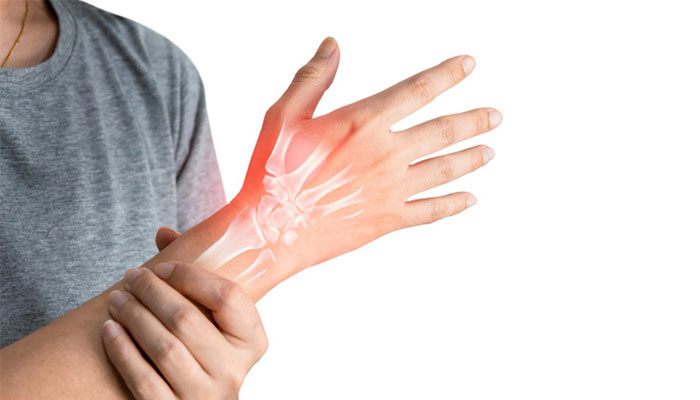Arthritis is a condition in which the joints swell and become tender. It is characterized by inflammation or degeneration of the joints, which can lead to pain when the joint is used. Common types of arthritis include:
- Osteoarthritis: In this condition, the cartilage (soft, slippery tissue that wraps around the ends of bones to form a joint) deteriorates.
- Rheumatoid arthritis: In this condition, the immune system attacks the joints.
Signs and Symptoms of Arthritis
The most frequently observed symptoms of arthritis are confined to the joints. However, depending on the form of arthritis, symptoms include:
- Pain
- Stiffness
- Swelling
- Redness
- Decreased range of motion
Causes of Arthritis
Arthritis has various causes, including genetics, immune system dysfunction, and joint wear and tear. Rheumatoid arthritis stems from an overactive immune response, while osteoarthritis results from the gradual breakdown of joint cartilage. Genetics can increase susceptibility, and injuries or infections can trigger some forms of arthritis.
Understanding Arthritis in Ayurveda
In Ayurveda, arthritis, commonly referred to as “Sandhivata,” is attributed to an imbalance of the body’s doshas, particularly aggravated Vata dosha. Poor dietary choices, a sedentary lifestyle, and irregular digestion can lead to the accumulation of Ama (toxins), which then accumulate in the joints, causing inflammation and pain. Additionally, external factors like exposure to cold and damp conditions are believed to exacerbate Vata-related joint problems.
Treatment and Management
Arthritis treatment aims to alleviate pain, reduce inflammation, and improve joint function. It includes medications like nonsteroidal anti-inflammatory drugs (NSAIDs) and disease-modifying antirheumatic drugs (DMARDs). Physical therapy, exercise, and lifestyle changes help maintain joint mobility. Some patients may require joint injections or, in severe cases, surgery is also recommended.
Care offered by SGP’s PSA has been demonstrated to be effective in alleviating symptoms and enhancing the quality of life for patients with arthritis. The primary focus of care delivered by the PSA is to manage symptoms, address emotional and psychological distress, and improve overall comfort.
FAQs about Arthritis
-
Certain weather conditions are known to exacerbate the symptoms of arthritis, with humidity and cold being two of the most common contributors to joint pain. This can be attributed to a variety of factors, including a decrease in physical activity during rainy and winter seasons. Additionally, cold, and damp conditions can cause stiffening of joints.
-
Yes, children can get a type of arthritis known as Juvenile Idiopathic Arthritis (JIA). Childhood arthritis is a condition that causes permanent physical damage to joints. Early diagnosis and treatment can help prevent or reduce the long-term effects of childhood arthritis.
-
Maintaining a healthy weight is essential for those with arthritis. For overweight or obese individuals, weight loss can help reduce pressure on their joints, especially the hip and knee joints. Regardless of age, anyone can lose weight by engaging in low-impact and arthritis-friendly exercise and making changes to their diet.
-
Arthritis can lead to depression and anxiety due to chronic pain and limitations in daily life. Managing these emotional aspects is essential for overall well-being.
-
Complementary therapies such as acupuncture, meditation, and dietary supplements like omega-3 fatty acids may offer relief and support for individuals with arthritis, along with conventional treatment. Consultation with a healthcare provider is advised.






